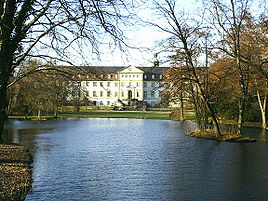
Johann Friedrich von der Decken
Encyclopedia

Graf
Graf is a historical German noble title equal in rank to a count or a British earl...
von der Decken (25 May 1769 - 22 May 1840) was a Hanoverian general and diplomat during the Napoleonic Wars
Napoleonic Wars
The Napoleonic Wars were a series of wars declared against Napoleon's French Empire by opposing coalitions that ran from 1803 to 1815. As a continuation of the wars sparked by the French Revolution of 1789, they revolutionised European armies and played out on an unprecedented scale, mainly due to...
.
Life
The Von der Deckens were an old noble family in Lower SaxonyLower Saxony
Lower Saxony is a German state situated in north-western Germany and is second in area and fourth in population among the sixteen states of Germany...
which produced several officers for the forces of the Electorate of Hanover
Electorate of Hanover
The Electorate of Brunswick-Lüneburg was the ninth Electorate of the Holy Roman Empire of the German Nation...
. In 1784 Johann Friedrich joined the army, fighting in the French Revolutionary Wars
French Revolutionary Wars
The French Revolutionary Wars were a series of major conflicts, from 1792 until 1802, fought between the French Revolutionary government and several European states...
from 1793 to 1795 before joining the diplomatic service in 1803 on Napoleon's occupation of Hanover and leaving for the United Kingdom. On 28 July 1803 he began recruiting expatriate Hanoverian soldiers to fight for the United Kingdom in the War of the Third Coalition and subsequent Napoleonic conflicts, with his recruits forming the King's German Legion
King's German Legion
The King's German Legion was a British Army unit of expatriate German personnel, 1803–16. The Legion achieved the distinction of being the only German force to fight without interruption against the French during the Napoleonic Wars....
, with which he fought from 1805 to 1807.
In 1808 he was sent to Spain and Portugal during the Peninsular War
Peninsular War
The Peninsular War was a war between France and the allied powers of Spain, the United Kingdom, and Portugal for control of the Iberian Peninsula during the Napoleonic Wars. The war began when French and Spanish armies crossed Spain and invaded Portugal in 1807. Then, in 1808, France turned on its...
as a diplomat and military advisor and to recruit troops to fight against France, before returning to England, where in 1815 he organised another Hanoverian regiment to fight against the French during the Hundred Days
Hundred Days
The Hundred Days, sometimes known as the Hundred Days of Napoleon or Napoleon's Hundred Days for specificity, marked the period between Emperor Napoleon I of France's return from exile on Elba to Paris on 20 March 1815 and the second restoration of King Louis XVIII on 8 July 1815...
. After the war he refused military decorations from the Netherlands and Prussia. In 1817 he bought the former Benedictine monastery in Ringelheim
Salzgitter-Ringelheim
Ringelheim is the sixth biggest suburb of Salzgitter in Lower Saxony, Germany. Located at the very far south-western end of the city, the most important station of the city is here, because the railway lines Hannover - Hildesheim - Salzgitter-Ringelheim - Goslar - Halle and Braunschweig -...
and rebuilt it as his country house, the Schloss und Park Ringelheim, spending his retirement there from 1833, the year in which he was made a count
Count
A count or countess is an aristocratic nobleman in European countries. The word count came into English from the French comte, itself from Latin comes—in its accusative comitem—meaning "companion", and later "companion of the emperor, delegate of the emperor". The adjective form of the word is...
(Graf
Graf
Graf is a historical German noble title equal in rank to a count or a British earl...
) by William IV
William IV of the United Kingdom
William IV was King of the United Kingdom of Great Britain and Ireland and of Hanover from 26 June 1830 until his death...
as king of the restored kingdom of Hanover
Kingdom of Hanover
The Kingdom of Hanover was established in October 1814 by the Congress of Vienna, with the restoration of George III to his Hanoverian territories after the Napoleonic era. It succeeded the former Electorate of Brunswick-Lüneburg , and joined with 38 other sovereign states in the German...
. In 1835 he also became president of the Historischen Vereins für Niedersachsen (Historical Society for Lower Saxony) and headed a military journal with his friend Gerhard von Scharnhorst
Gerhard von Scharnhorst
Gerhard Johann David Waitz von Scharnhorst was a general in Prussian service, Chief of the Prussian General Staff, noted for both his writings, his reforms of the Prussian army, and his leadership during the Napoleonic Wars....
, the Prussian military reformer.

